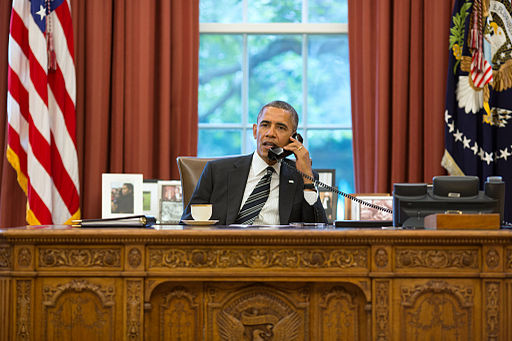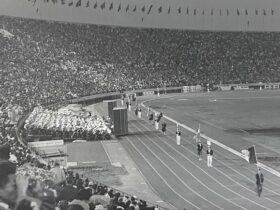
(Pete Souza [Public domain], via Wikimedia Commons)
Last week, Iranian President Hassan Rouhani announced that Iran has no interest in building nuclear weapons, either for national prestige or for security reasons. He went on to remark that he is willing to sit down with President Obama and discuss a rapprochement between the United States and Iran. President Obama cautiously agreed, and the agreement has led to both criticism and applause within their respective governments. Few details have emerged, but the foreign policy community has already started chiming in on this surprising development.
In a year where the Russians have agreed to mediate negotiations for a Syrian truce and disarmament, perhaps nothing should come as surprising. Yet on the Iranian question, no greater shock could have come, save perhaps a preemptive strike by the Americans and/or Israelis. The United States and Iran have been diplomatically disengaged from each other since the 1979 Iranian Revolution, and for the last 10 years relations have only worsened as the two states have played a sort of game of thrones over the ashes of Iraq and influence in the Gulf region. The Iranian nuclear program, funded for decades before the fall of the Shah by the very Western governments which now so viciously condemn it has for the last decade been the most visible point of contention between Iran and the United States. Additionally, Iran’s aspirations for regional leadership and dominance ensured that there has been no shortage of American efforts to contain the Shia nation and prevent it from upsetting the regional balance of power. The seeming radicalism of Mahmoud Ahmedinejad, most callously expressed in his denial of the Holocaust, did not help the diplomatic situation in any way.
When Rouhani succeeded Ahmedinejad, there was buzz among the Western media suggesting that this man might be “our man;” he seemed progressive and democratic enough and his words sounded good. Add on to that the events of the Green Revolution in 2010 and the subsequent Arab Spring and there seemed to be an inkling that liberal populism might provide Rouhani the legitimacy necessary to fundamentally change Iranian policies – both foreign and domestic. But after a brief media honeymoon, his fame died a slow and quiet death, as Iranian policy did not appear to differ significantly from that of Ahmedinejad.
Fast forward to today, when we see Rouhani apparently making baby steps in a progressive direction. He has renounced over a decade of Iranian security policy, while making overtures to integrate Iran with the international community. As many commentators have noted, this should not be seen as a sudden change of heart; the Iranian President is undoubtedly still confined by certain limits and boundaries. Nevertheless, this change in tone marks a critical shift, one which will certainly have profound effects on the region. Already the Saudis and Israelis have voiced their disapproval of impending US negotiations with Iran. I recall becoming disillusioned after years of catching the oft-used “Israeli strike on Iran closer than ever before!” headline and resigning myself to the conclusion that the United States and Iran would remain enduring enemies, periodically exchanging harsh words but never anything more. It appears that this state of affairs may soon change.
This saga illustrates an interesting principle of politics best articulated by former Secretary of State George Kennan: “No other people… is entirely our enemy. No people at all… is entirely our friend.” Shifting power paradigms tend to manifest themselves in surprising ways; to the futurist or to the contemporary observer, this development may appear seemingly irrational, yet to the historian looking back it seems perfectly sensible. And thus great shifts in the balance of power are common occurrences in world politics, with many of them marking new political eras.
In 1992 the Europeans signed the Maastricht Treaty and established the European Union. Between 1989 and 1991 the Soviet Union crumbled and the world map was redrawn. In 1973 the People’s Republic of China turned on their former Communist friends in the Soviet Union and instead began working with the United States. Throughout the 1950s and 1960s, the former colonies of the old European empires claimed their independence. And in each case, observers were shocked; only two or three years earlier there would have been no indication that radical change was on the horizon. This is how the present cooling of relations between the United States and Iran should be viewed: a political anomaly that does not make sense now but one day will be heralded as a major breakthrough in international relations.







